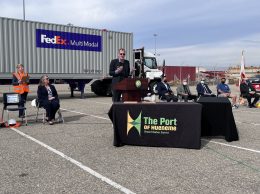Costs add up for business, port as White House urges talks
IN THIS ARTICLE
- Latest news Topic
- Marissa Wenzke Author
By Marissa Wenzke Friday, February 20th, 2015
As U.S. Secretary of Labor Thomas Perez flew into San Francisco on Feb. 16 to assist in labor negotiations between West Coast port workers and employers, the Port of Hueneme struggled to keep up with shipments after its operations were shut down for days due to the ongoing labor dispute.
“There’s ships just sitting at sea,” Port of Hueneme Director Kristin Decas said. “It’s putting a lot of stress on the supply chain… We’re scrambling.”
More than two dozen ports along the West Coast have faced delayed shipments and oftentimes major financial losses as a result of work stoppages initiated by the Pacific Maritime Association, which has been embroiled in a labor dispute with the International Longshore and Warehouse Union since previous negotiations expired in July. The association represents 72 companies, including shipping lines and terminal operators, while the union represents about 20,000 dockworkers along the West Coast.
On Feb. 11, the Association released a statement announcing it would suspend vessel operations over the following holiday weekend, which would have included higher pay rates of about $54 to $75 an hour for longshore workers and clerks and $72 to $92 an hour for foremen. Current contracts for these dockworkers pay a regular wage of about $26 to $41 an hour, including free healthcare.
PMA said the work stoppages were set forth because union representatives failed to accept a deal it offered earlier in February.
Warren Shelton, a longshore clerk and secretary-dispatcher for the Port Hueneme chapter of the ILWU, said dockworkers are not on strike and have been ready to work on the days that PMA has called for work stoppages.
“We’re ready to work, and they’re just not putting orders in,” he said. “I’ve never seen anything like this in the 34 years I’ve been here.”
PMA could not be reached for comment as of press time, but port officials have said that they are supporting neither PMA or ILWU.
“From the port’s perspective, we’re stuck in the middle of this,” Decas said. “We don’t have a side in the negotiations.”
The last time the dockworkers’ union went on strike was in 1971, Shelton said, but port officials fear that PMA could launch a full-blown shut-down of vessel operations.
“That’s our biggest concern,” Decas said. “Will the PMA just call off labor? That’s a real concern for us.”
As the dispute has dragged on, worsening this past winter, the Port of Hueneme has gained a little business from nearby major ports in Los Angeles and Long Beach. However, the gains have been marginal, Decas said, and the port has still suffered overall.
“It’s not like we’re booming with new business.”
Ports in Los Angeles and Long Beach have lost 25 percent of their market share as a result of shipment delays in recent months, Decas said. The Port of Oakland has reported that cargo volume dropped to 44,171 containers in January, falling 39 percent from the same month last year. Meanwhile, its exports fell by 26 percent to 57,581 containers.
In Hueneme, a shut-down of vessel operations has left the port with a backlog of orders to deal with, among other issues. For one, it’s been difficult to move forward with new business deals when labor negotiations are ongoing and appear to have no definite end, Decas said, mentioning one Chinese company that was hesitant to move forward in light of the uncertain future cost of labor.
“It creates challenges for gaining new business opportunities,” she said. “If you don’t know the cost of labor, that creates an uncertain business environment.”
With two multiple-day work stoppages occurring in February alone, the labor dispute left West Coast ports with a competitive disadvantage, according to port officials and business owners.
“When the supply chain is that broken…companies go to the East Coast, Canada and Mexico,” Decas said.
In fact, perishables such as produce, an industry the Port of Hueneme specializes in, have been increasingly diverted to ports along the East Coast.
“A lot of it’s going to Philadelphia,” Decas said.
In response to the ongoing dispute and the additional business it’s given to ports in other parts of the country, many eastern ports have raised their rates. Kelly Bennett, president and chief operating officer at Kelly Direct, a Westlake Village firm that consults with supply chain operations in the Port of Los Angeles, said it’s been difficult to keep pushing shipments through L.A.
“Because of all the people diverting traffic to the East Coast…they’ve jacked up their prices there,” she said. “So it’s either take a gamble and bring it into L.A., or pay up to four times as much to have it shipped through the East Coast.”
Bennett said the company has been “severely impacted” in regards two projects, including a major deal with a well-known soft drink company that was shipping Super Bowl promotional materials to a big-box retailer. Due to work stoppages, the final delivery of the shipment was missed.
And missed deliveries and sitting ships have caused considerable losses that are still being passed down the supply chain.
“It also affects all the products that are sitting on the vessels and not being unloaded, said Oxnard Harbor Commissioner Mary Anne Rooney. “It breaks that chain of smooth movement of goods…and when there’s a glitch in the supply chain, it trickles down to the consumer.”
Related Articles
 Monday, January 31st, 2022
Monday, January 31st, 2022












